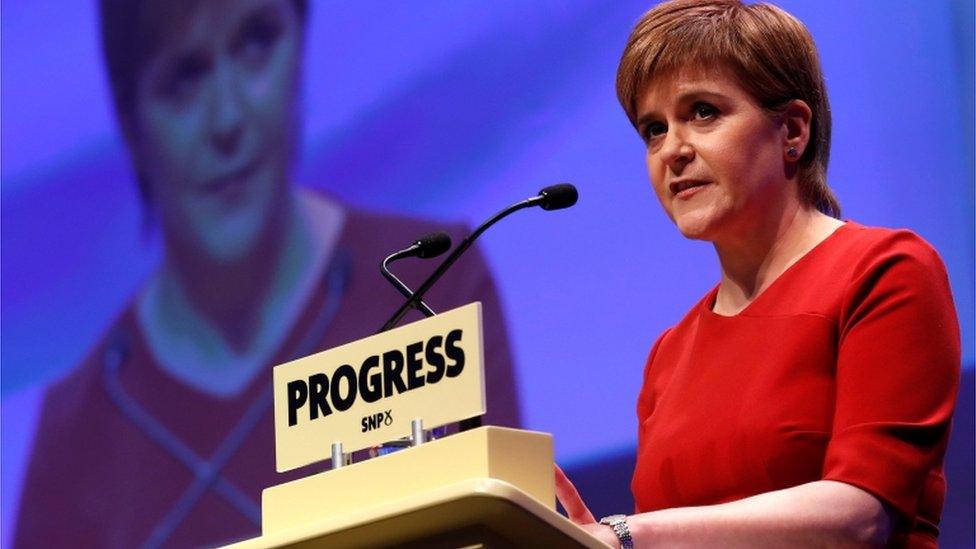SNP conference: what did we learn?
- Published
The SNP's autumn conference came with the party facing questions over their performance in government, the constitution and losses in June's general election. So what did we learn from the party's three-day gathering in Glasgow?

Policies
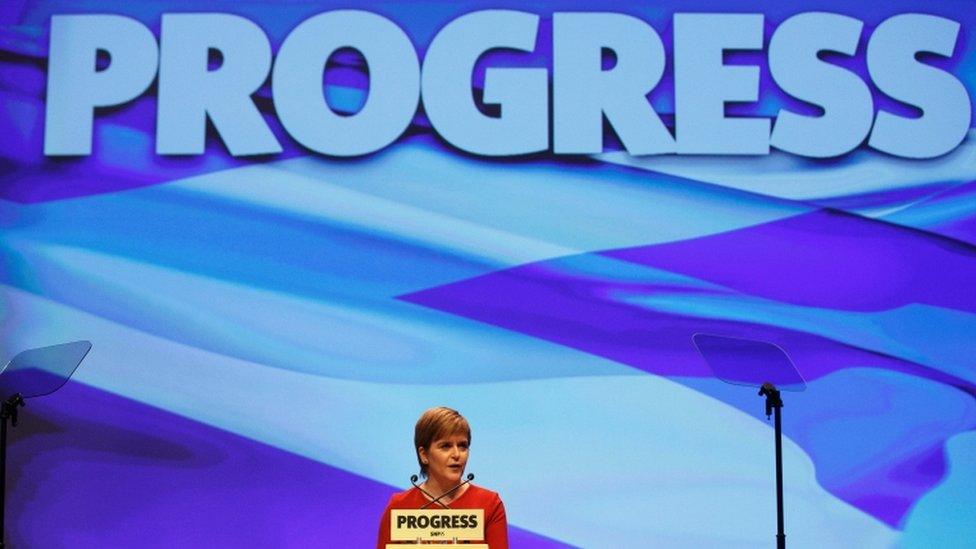
Nicola Sturgeon's speech in particular contained plenty of policies
John Swinney got the ball rolling by announcing £20,000 bursaries for professionals in key subjects to go into teacher training.
But it was Ms Sturgeon's speech where most of the meat was to be found. Perhaps the most eye-catching pledge was for a publicly-owned, not-for-profit energy company to be set up by the end of the current Scottish Parliament term - so by 2021.
This would be a fine centrepiece to most speeches, but there were other policies too right across the board of devolved competence.
A doubling of investment in nursery education. Council tax exemptions for young care leavers. Permission for a community buyout on the island of Ulva. A low-emission zone in Glasgow by the end of 2018. A warning to councils to use allocated housebuilding funds, or lose them.
This was a continuation of Ms Sturgeon's approach in her programme for government earlier in the year - a conspicuous focus on the "day job" of running Scotland, in a bid to ward off criticism of constitutional obsession.

SNP still dominant
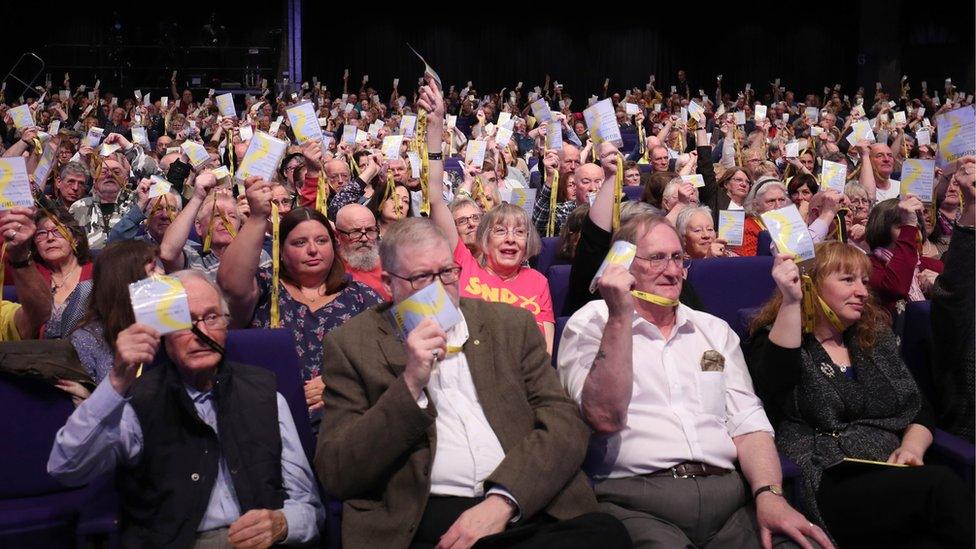
The SNP's membership base remains the envy of almost every other party
Much has been written about the SNP's apparent struggles of late, in the wake of their loss of 21 seats in June's general election and Nicola Sturgeon's subsequent reset of her indyref2 timetable.
And it's true that the surge of momentum that has propelled the party since the 2014 referendum has receded somewhat.
But all things are relative.
The SNP remains the biggest kid in the playground in Scottish politics, by some distance. They have more MSPs, MPs, and councillors than anyone else; recent polls still put them comfortably ahead of their opponents.
The fact that winning "only" 35 of Scotland's 59 seats in June's Westminster election is seen as a terrible setback for the party is a mark chiefly of how high they had risen.
Depute leader Angus Robertson made this point forcefully during his brief appearance, despite the slightly awkward detail of him no longer being one of those elected representatives.
This elephant in the room was a timely reminder that for all its dominance, the party is not guaranteed to win every scrap - but, as the thousands of delegates streaming out of the doors proved, they remain heavy favourites.

Sturgeon supreme
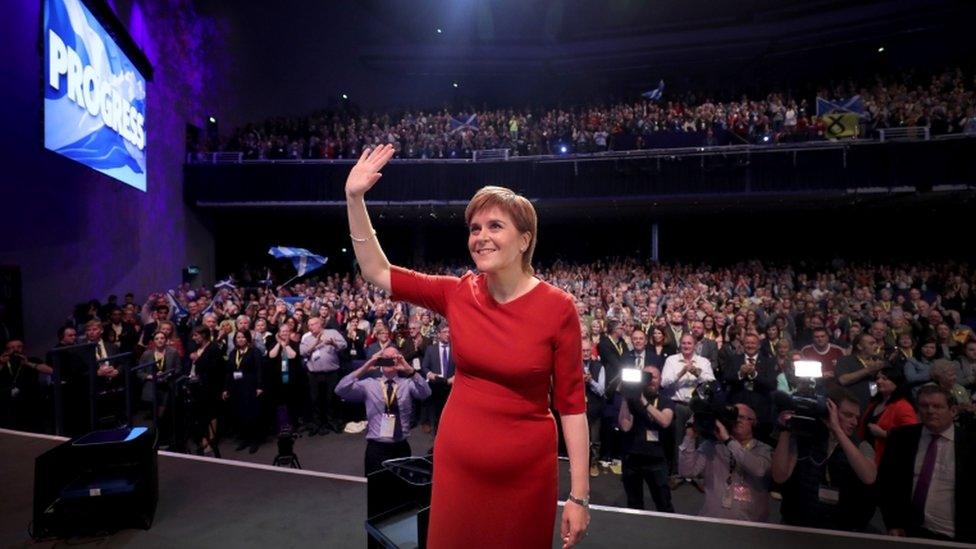
Nicola Sturgeon won the usual rapturous welcome from the SNP conference
At conference, and in many other places, the surname is now superfluous. Scotland's first minister is just "Nicola".
As mentioned above, some questions have been posed about Ms Sturgeon's leadership after a difficult year. The opinion polls trumpeted by the party throughout as showing their continued dominance also showed that Ms Sturgeon has divided opinion neatly in half, with Jeremy Corbyn and Ruth Davidson both recording more positive scores.
Here's the "but" again, though. Once again, Ms Sturgeon's speech was the SNP conference. It was the moment every delegate was waiting for, and the policy-rich statement contained all but a handful of the news lines from the whole event.
At conference she is utterly comfortable. She held the packed-out auditorium in the palm of her hand. Even when delegates willed her to go further - such as over independence - they did so while standing and applauding.
At the infamous SNP Youth karaoke event, a spontaneous chant of "oh, Nicola Sturgeon" even sprang up a capella.
During the introduction, depute leader Angus Robertson asked how many people in the hall had joined the SNP since the 2014 referendum; a forest of hands shot up. This is Nicola Sturgeon's SNP.
That said, away from the main stage, there might have been a subtle effort to make the party less of a one-woman show. While in previous years much of the party merchandise has been emblazoned with "I'm with Nicola" or "Nicola Says Yes" - in March in Aberdeen there were even some knitted Nicola dolls - her name and image was notably absent from the latest range of SNP T-shirts, tote bags and phone cases.
The first minister's image was also absent from the front of the conference guide, for once. The idea seemed to be to focus attention on the party's achievements over 10 years in government, not just on the popularity of its leader.

Fringe dissent
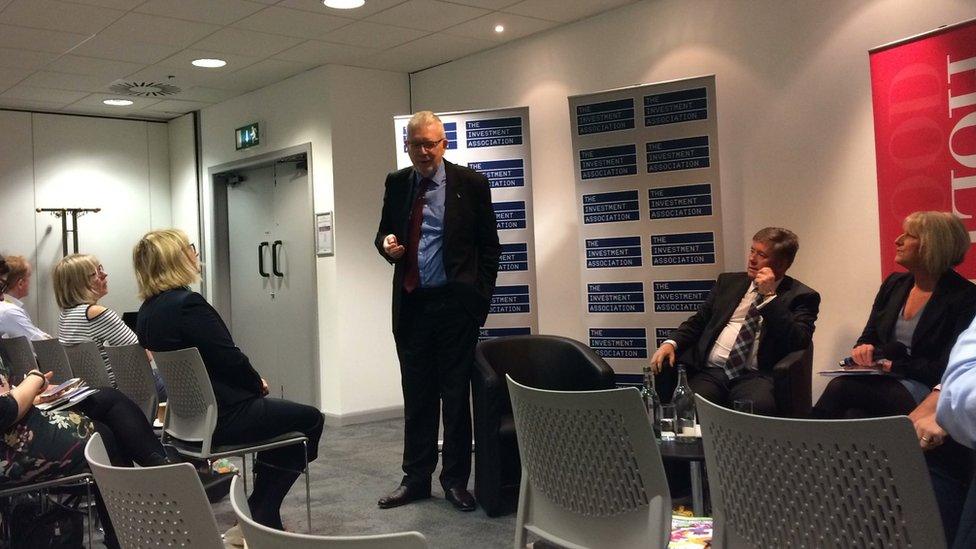
Mike Russell was a regular fixture at the endless fringe events about Brexit
At any party conference, unless the stage set literally falls apart, the most interesting action is usually found unfolding at fringe meetings.
They are glorious places for discovering new things that people are surprisingly passionate about. I discovered a whole new world of hurt feelings about pine weevils and non-native trees at a Woodland Trust fringe.
These meetings are also generally the best place to come across dissent from the party line. People can chip in with "more of a comment than a question" to put their concerns directly to a cabinet secretary.
Michael Matheson discovered this when he was confronted by a mother whose daughter recently quit the police force in despair at the long hours and lack of resources.
"This isn't a Tory government, this isn't a Labour government, this is my party and you are letting down your officers," she told the distinctly uncomfortable justice secretary.
Education Secretary John Swinney also heard some fairly stark worries about teachers being "on their knees" at an EIS fringe, while Brexit minister Mike Russell came across a wide range of views at some of the ten (yes, ten) fringes on that topic.

Catalonia
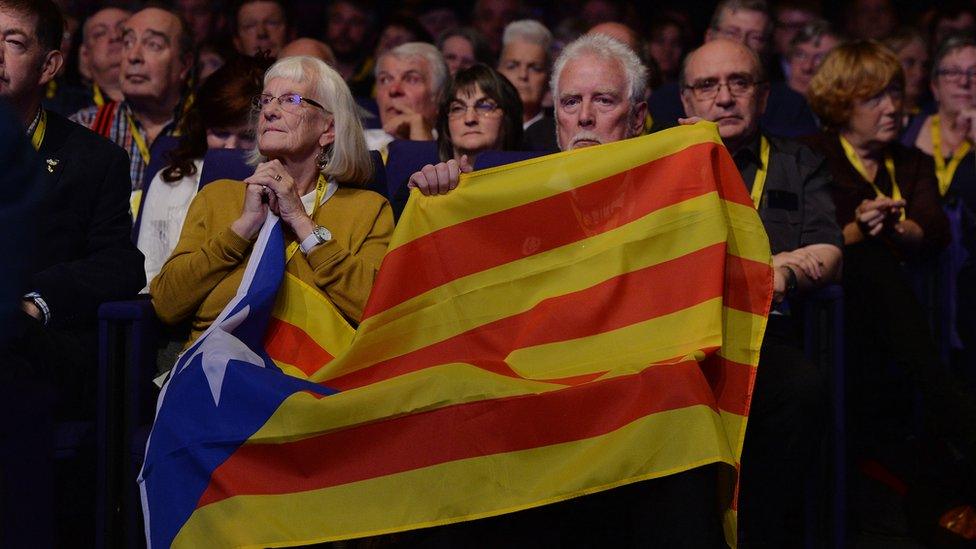
Catalan flags were much in evidence at the SNP conference
Possibly the longest ovation of the conference - for anyone with a name not ending in "urgeon" - was for some representatives of the Catalan government, who didn't even get onto the stage.
Catalonia was fairly inescapable throughout the conference, from flags flying inside and out to T-shirts and pin-badges.
There is vast sympathy amid the SNP's activist base for the Catalans, fellow seekers of independence. The party's leadership share this - up to a point. They are torn between sympathy for the cause, and their desire for a legitimate process, in the style of the Edinburgh Agreement.
Privately, party bosses crossed their fingers that there was no declaration of independence from Catalonia during the conference; you could almost hear the chants of "UDI" welling up in the hall already.
Significantly, the Catalan question has also shown up some discontent about the EU amid the party faithful. By and large the tone of the conference was very pro-Remain - but there were creeping moments of doubt over the group's response to the police violence in Spain. There were probably more Catalan flags on display than EU ones.
Ms Sturgeon made reference to this, as did Mike Russell; but they were quick to stress after any criticism that they remain committed to European Union membership.
Given the likely case for indyref2 is founded on Brexit, any dilution of pro-EU spirit in the party could prove significant.

Independence
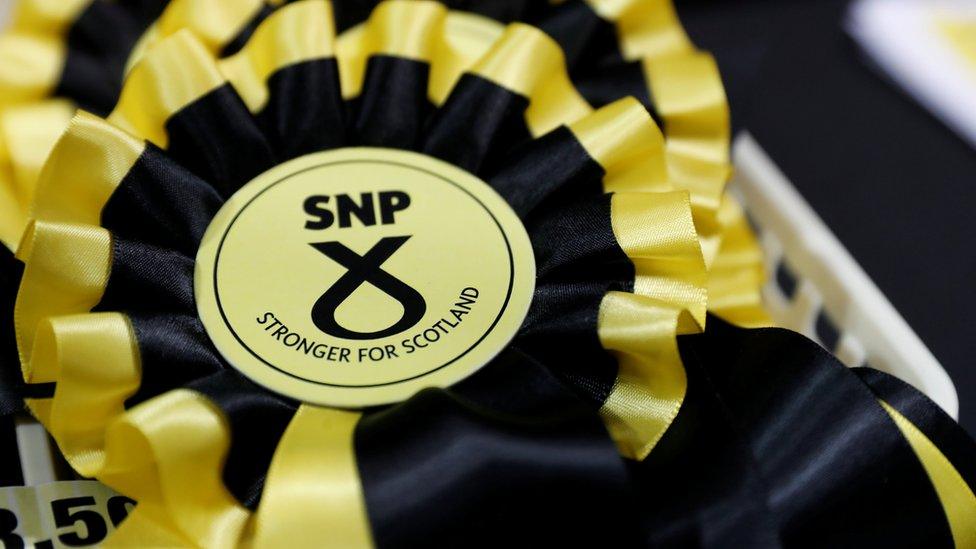
Believe it or not, the SNP are in favour of independence
The SNP? In favour of independence? Well, I never.
No, it's not a surprise in any way. But there were quite a lot of mentions of independence at this conference; most of the main speakers were sure to get a plug in at some point, and by and large were rewarded with the largest cheer of their speech.
Many stressed the ultimate goal of "independence in the EU", just to underline that that is still the aim. To coin a phrase ruined by someone else, "nothing has changed".
Ms Sturgeon has parked independence on a back burner, but she needs to make sure the flame doesn't go out entirely. Hence there was some red meat for the conference crowd, with no firm commitments to anything.
There was an element of "is that it?" to the ovation her remarks on independence (eventually) drew, but the activists were at least left with the impression that their leader shares their impatience.

The 'day job'
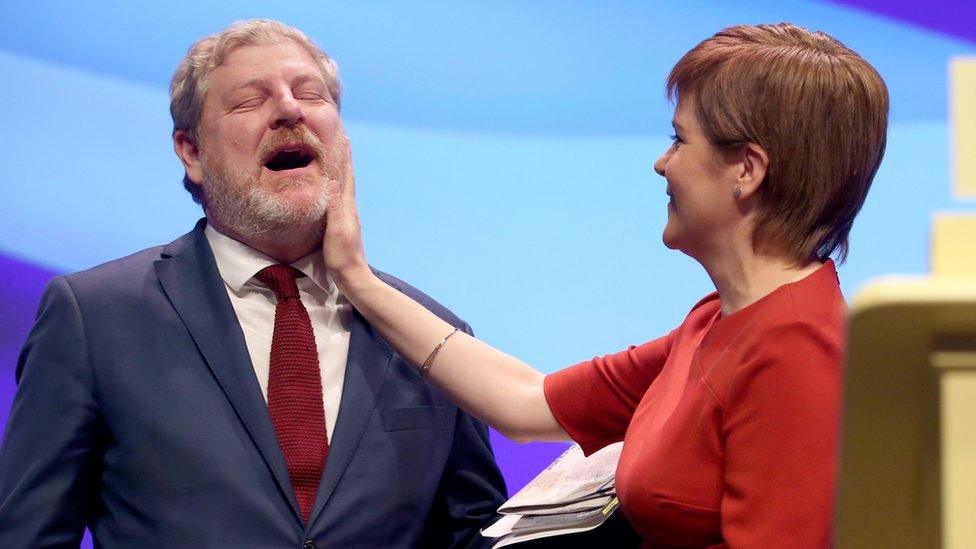
Up until Ms Sturgeon's speech got the faithful on their feet, the gathering hadn't quite had the energy of some recent SNP conferences.
There are a series of good reasons for this. For the first time in what feels like years, this conference wasn't held in the run-up to a major vote of some kind. Activists might not need to be fired up to get out on the doorsteps for a couple of years.
Secondly, Ms Sturgeon spent her summer recharging her government's batteries, for the relaunch of her programme for government speech. Most of the really big ideas were either packed into that speech, or held over for her keynote address which brought down the curtain.
The SNP has a lot of work to do at Holyrood. They have set themselves an ambitious set of reforms, particularly on the environment, and that's on top of bread and butter issues like education and health which invariably throw up challenges for any government.
So at times there was a slightly managerial tone to the conference. The chosen theme of "progress" at times became more a matter of "process".
The party's leaders were keen to stress in their speeches that the SNP remains a steady hand at the tiller. A relative beacon of calm amid the stormy seas of Brexit and the seemingly eternal infighting at the top of the UK government.
And if that sounds a bit like "strong and stable" - another perfectly good phrase ruined by a politician - maybe it's because being in government carries similar challenges wherever you are.
- Published10 October 2017
